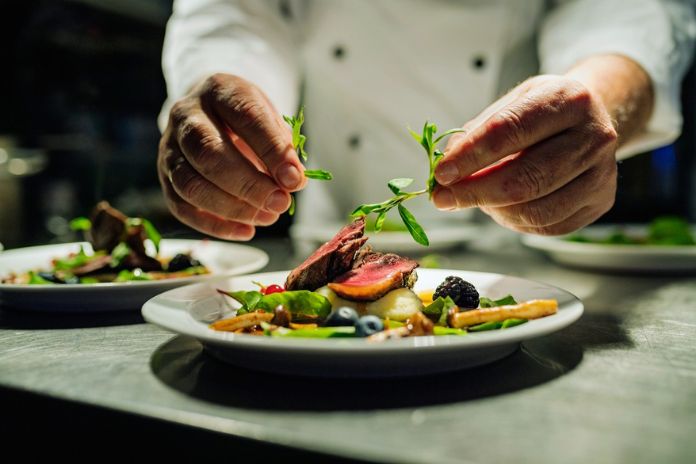Ensuring food safety means adopting the most suitable and effective measures to prevent or minimize food contamination. Depending on the triggering factors, there are three possible types of food contamination :
- physical contamination due to the presence of foreign bodies such as splinters, hair, fragments of glass, or other materials;
- biological contamination brought about by microbes, infections, or parasites;
- Chemical contamination is caused by pesticides, detergents, chemicals, or materials unsuitable for food packaging.
Therefore, food preparation and storage require specific precautions, which are often neglected or considered not particularly important. This article will offer four practical tips to prevent food contamination.
Hygiene Comes First
First, it is essential to guarantee the hygienic conditions of the environment in which the food will be prepared/cooked, also paying particular attention to the care of the person who will come into contact with the food. Therefore it is necessary always to wash your hands, not only before starting the activity but also, for example:
- in the manipulation between different foods, especially if you go from raw to cooked ones;
- after going to the toilet;
- after eating, drinking, or smoking;
- after coughing, sneezing, or putting your hand to your mouth;
- in general, whenever food processing is interrupted.
The same attention must also be paid to work surfaces and equipment that come into contact with food, which must always be cleaned and disinfected to avoid contamination. Furthermore, clothes and tea towels will have to be washed and replaced often, not to mention that a vital role is also covered by work clothing: to learn more about this issue, read our article on clothing and personal care in the food hygiene sector: what the legislation says.
Avoid Cross-Contamination
Cross-contamination involves the passage of pathogenic microorganisms or chemical substances from one food to another. It can happen indirectly (through hands, surfaces, or work tools… that’s why the first point is so important) or directly when two foods come into contact with each other.
In general, it’s essential to separate raw from cooked foods and raw from each other. For this reason, it is always advisable to use unique (closed) containers to store in the fridge, paying attention to the symbols on them (especially those in plastic) to avoid physical contamination due to the materials of the container.
Proper Storage Of Food
To prevent food contamination, it is essential to pay attention to the correct storage methods: sometimes, bad habits or actions taken simply lightly can make a huge difference. Each food item has its storage temperature, which must also be considered when positioning the food inside the fridge: in general, the lowest compartment coincides with the coldest area, ideal for storing meat and fish, while the fruit and vegetables will be placed in the drawers (do not wash them before placing them in the fridge, in order not to favor the proliferation of bacteria). The central area is more suitable for cooked meats, foods to be preserved after opening, eggs, and dairy products, while cheeses, cold cuts, and tins can be placed in the higher area. For proper food storage, also consider these tips:
- do not overload the fridge with too many foods to allow the cold air to circulate freely and keep the foods at the expected temperature;
- To thaw out food, move it from the cooler to the fridge. It will take longer, but it is the safest method: defrosting at room temperature causes bacteria to increase;
- Do not put food that you have defrosted back into the freezer: interrupting the cold chain increases the bacterial load.
The “Decalogue Of The Good Foodist” To Prevent Food Contamination
This trip includes 10 of them! There can be many good rules to follow to prevent food contamination. Among the information contained, there is also a ” decalogue for good foodies “with ten valuable tips on food hygiene: let’s see what they are.
- Take care of personal hygiene and clothing.
- Wash and disinfect your hands often, and use soap dispensed from a dispenser and disposable towels.
- Do not handle food if you suffer from a cold, sore throat, or pustular lesions on your hands. Protect your nose and mouth with a mask and your hands with disposable gloves if necessary.
- Keep work, storage, and sales rooms in perfect and constant conditions of cleanliness and well-ventilated.
- Wash worktops, tools, and machinery with detergent and disinfectant solutions, at least at the end of each work shift.
- Keep foods at temperatures unsuitable for the multiplication of microbes.
- Remember that the foods most at risk of causing poisoning are: minced meat, meat to be eaten raw, soups and dishes based on meat or in meat broth, fish and seafood, eggs and egg-based foods, milk, dairy products, and foods containing them.
- Protect food using showcases, exhibitors, and counters, to prevent customer contamination.
- Avoid touching food with your hands. Instead, use forks, spoons, spatulas, napkins, paper, and other objects suitable for the purpose.
- Keep flies, mice, and insects away (garbage in closed containers, nets on windows)
Also Read: Egg Protein: Check The Benefits

